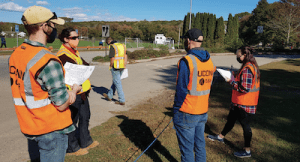Connecting Students to Communities
 Riverfront climate resilience. Low impact development practices to reduce stormwater runoff. Brownfields redevelopment grant proposals. Forest resilience planning. The impact of sea level rise on marinas. What do all these things have in common? They are all the focus of projects conducted for Connecticut communities by undergraduates enrolled in the Environment Corps, a new educational model gaining momentum at UConn.
Riverfront climate resilience. Low impact development practices to reduce stormwater runoff. Brownfields redevelopment grant proposals. Forest resilience planning. The impact of sea level rise on marinas. What do all these things have in common? They are all the focus of projects conducted for Connecticut communities by undergraduates enrolled in the Environment Corps, a new educational model gaining momentum at UConn.
in this ambitious project that combines undergraduate classroom instruction, service learning, and Extension outreach to the benefit of both the students and the communities of Connecticut. The UConn Environment Corps (“E-Corps”), funded by a five-year grant from the National Science Foundation, is designed to get students real world experience in tackling some of today’s most thorny environmental problems as they conduct projects in partnership with town and cities across the state. The project involves an impressive coalition within UConn that includes four schools/colleges, five academic departments, four University centers, and the Provost’s Office.
E-Corps is an outgrowth of the success of the Climate Corps, a three-year pilot project that began in 2016 and is focused on the local impacts of, and responses to, climate change. The Climate Corps is taught by a team of two Extension educators, Juliana Barrett from the Connecticut Sea Grant College Program and Bruce Hyde from the UConn Center for Land Use Education and Research (CLEAR). With the Climate Corps, Juliana, Bruce and the extended project team pioneered the E-Corps approach, that combines a semester of interactive classroom work with a second semester of independent study where student teams work on projects designed to assist Connecticut communities.
The Climate Corps was joined by the Brownfield Corps in 2018, developed and taught by Maria Chrysochoou and Nefeli Bompoti of the Department of Civil and Environmental Engineering (CEE). The Brownfields Corps is a key part of the new Connecticut Brownfields Initiative, also led by CEE. Then, with the spring semester of 2020 came the debut of the Stormwater Corps, taught by Extension educators Mike Dietz, Dave Dickson and Chet Arnold from CLEAR. The success of all three courses depends heavily on the relationships built between these faculty members and the communities of Connecticut, enabling the development of student projects that bring real value to the towns and cities partnering with UConn.
The NSF grant has resulted in the expansion of the original team to include other players at UConn. Experts from the Center for Excellence in Teaching and Learning (CETL) now assist the course instructors on teaching techniques, and researchers from the Neag School of Education are conducting studies on the impact of the E-Corps model on students, faculty, communities, and the University itself. With 244 students and 53 community projects to date, there is already evidence that the project is having impact. In the case of students, the impact may be broader than the team originally conceived. E-Corps was originally designed to target students majoring in Environmental Sciences, Environmental Studies, and Environmental Engineering, but has already attracted students from 15 other majors, including both STEM (e.g., Biological Sciences, Chemical Engineering, Civil Engineering) and non-STEM (e.g., Economics, English, Political Science, Urban and Community Studies) fields.
One goal of the overall project is to extend the reach of the E-Corps model by making it adaptable to other disciplines at UConn, and eventually to peers at other universities. Much of this will depend upon the team’s ability to fashion a faculty and student support system at UConn that can ensure the sustainability of the model beyond the end of the grant. So, stay tuned!
Article by Chet Arnold